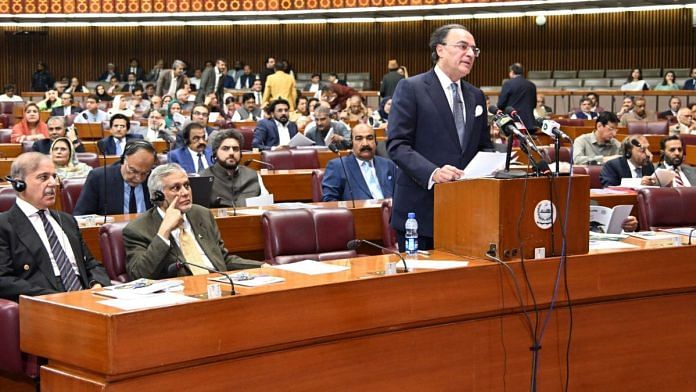Finance Minister Muhammad Aurangzeb unveiled the federal budget for fiscal year 2025–26 which stands at PKR 17.573 trillion (Rs 5.27 lakh crore), down 6.9% from the previous year.
However, Aurangzeb announced a significantly increased allocation of PKR 2.55 trillion (approx Rs 76,500 crore) for defence, up from PKR 2.12 trillion (approx Rs 63,600 crore) in the outgoing fiscal.
In FY25, Pakistan had allocated PKR 2.1 trillion (approx Rs 63,600 crore) for defence. Additionally, PKR 563 billion ($1.99 billion) was earmarked for military pensions, which are not included in the official defence budget.
The new defence allocation accounts for 14.5% of Pakistan’s total federal budget and around 2.2% of its GDP, which is projected at $411 billion (Rs 34.3 lakh crore). Including military pensions, total military-related expenditure for last year stood close to PKR 2.66 trillion (Rs 79,800 crore), or about 3.2% of GDP.
In contrast, India’s defence budget for 2025-2026 was marked at Rs 6.57 lakh crore, nearly nine times Pakistan’s defence outlay and higher than Pakistan’s entire federal budget. However, India’s defence spending, which includes pensions, amounts to merely 1.9% of its GDP.
The finance minister began his address tabling the budget in the National Assembly on Tuesday by announcing: “This budget is being presented at a historic time when the nation showed unity (and) determination,” he said, hinting at the hostilities between India-Pakistan last month.
“The spirit with which we protected our national sovereignty, we need to ensure our financial security in the same way,” the minister said, as he outlined a series of economic reforms and fiscal targets.
The country’s Planning Minister, Ahsan Iqbal, had already hinted on Saturday that the government would be hiking its defence budget for the 2025-26 fiscal year.
“It is our national duty to provide the armed forces with whatever they need in this budget to bolster their capacity and defend our country in the future. It has been proven that we have a dangerous neighbour (India) who attacked us in the night, but we gave them a befitting response,” he was quoted as saying by Pakistan’s .
The budget was presented a day after Aurangzeb unveiled the Pakistan Economic Survey 2024–25, which showed the country’s economy had grown 2.5% in FY24 and was projected to grow 2.7% in FY25. While that marks a recovery from the -0.2% contraction in 2023, the growth remains below historical averages and lower than the 3.6% initially targeted for this year.
The country’s total debt now stands at PKR 76 trillion (approx $274 billion or Rs 22.89 lakh crore), of which PKR 51.5 trillion (Rs 15.45 lakh crore) was domestic and PKR 24.5 trillion (Rs 7.35 lakh crore) was sourced externally.
In nominal terms, Pakistan’s economy is estimated to have grown to $411 billion (Rs 34.3 lakh crore), still far below its regional peers. Aurangzeb, however, called the upcoming fiscal year a “turnaround story” and projected a modest but stabilising recovery.
He said global GDP growth was expected at 2.8%, placing Pakistan’s outlook within a comparable international frame.
The budget comes under the watchful eyes of the International Monetary Fund (IMF), with which Pakistan remains engaged under a reform-linked bailout programme.
Amidst the 87-hour India-Pakistan conflict earlier last month, the IMF had cleared immediate disbursal of $1 billion on 9 May to Pakistan for economic reforms under a package approved last year and another $1.4 billion to reduce vulnerabilities to natural disasters.
As part of this programme, Pakistan has committed to raising revenue and cutting its fiscal deficit. Subsequently, The 2025-2026 budget has set an ambitious tax revenue target of PKR 14.131 trillion (approx Rs 4.24 lakh crore), an 8.95% increase over last year’s goal. However, the Economic Survey acknowledged the challenge of meeting this target amid sluggish growth and new trade tariffs from the US, Pakistan’s largest export destination.
Aurangzeb also announced on Tuesday, moves to procure cheaper energy by shutting down expensive power plants and attracting foreign investment from countries like Turkey in the oil and gas sector, underscoring Pakistan’s deepening ties with Turkey.
Pakistan’s Parliament will now begin debating the budget on Friday, 14 June, after a two-day recess. Discussions will continue until 21 June, followed by debate and voting on grant demands and motions on 24 and 25 June. The Finance Bill 2025 is expected to be passed on 26 June, with supplementary grants taken up the next day.
(Edited by Viny Mishra)








